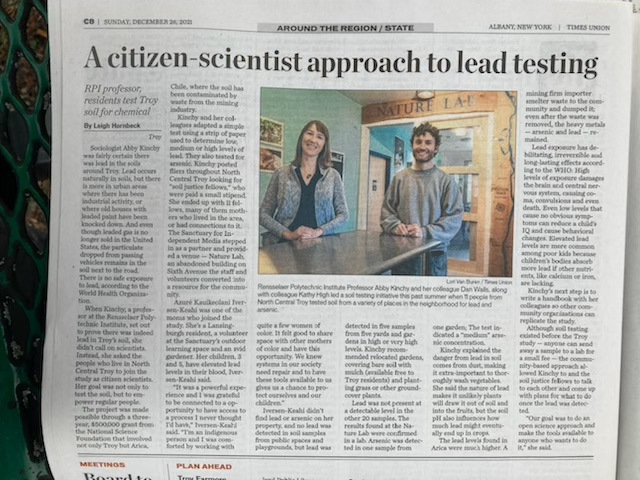Are you interested in doing a arsenic study in your community? Our handbook on how to assemble and use a low-cost arsenic screening kit are now available for download. There are English and Spanish versions of these publications.

Do-it-together screening for soil pollution
Are you interested in doing a arsenic study in your community? Our handbook on how to assemble and use a low-cost arsenic screening kit are now available for download. There are English and Spanish versions of these publications.

Dan, Delia, Robert, God’sgift, Zain, Abby, Sebastián, Salvatore, and Mónica published a paper entitled “Low‑cost screening method for estimating inorganic arsenic in soil” in Environmental Science and Pollution Research. You can find the article here.
Abstract
People facing pollution do not always have the resources needed to investigate their environment for harmful contaminants. In this paper, we report on a low-cost, accessible method to screen soil for inorganic arsenic, a substance associated with a growing list of acute and chronic diseases. The method adapts a commercial water test kit, which measures inorganic arsenic between 0 and 500 μg L −1 on a quantitative, discrete color scale. We evaluated two extraction solutions in determining bioaccessible and total inorganic arsenic. We characterized soil samples and standards containing total arsenic between 0.8 and 3240mg kg −1 (n = 151) with the screening methodology and established laboratory methods. While the total screening method requires additional investigation, we propose the bioaccessible screening method for two purposes. First, it estimates in vitro bioaccessible assay (IVBA) arsenic ( y = 0.0972x , R2 = 0.576) to provide physiological insight. Second, it estimates
a predicted minimum amount of total arsenic to compare to regulatory soil levels. Screening measurements above 82.5 and 132.0μg L −1 are predicted to exceed the Arizona Department of Environmental Quality (AZDEQ) and New York Department of Environmental Conservation (NYDEC) regulatory soil levels: 10 and 16 mg kg −1 , respectively. False positives are almost entirely avoided, while the occurrence of false negatives increases approaching the predicted thresholds. Screening measurements in the ranges [0, 10), [10, 25), and [25, threshold] μg L −1 were false negatives (false omission rate) 0, 18.8, and 81.4% (AZDEQ) and 0, 8.7, and 68.5% (NYDEC) of the time, respectively. Our analysis supports screening total arsenic to at least as low as 8.5 mg kg −1 .
Are you interested in doing a soil study in your community? Our handbooks on how to organize a community soil study and how to assemble and use a low-cost lead screening kit are now available for download. There are English and Spanish versions of these publications.
The Times Union interviewed Abby about the project and soil workshops held in August. You can read the published article here.

The Soil Justice Fellows reconvened with the Our Soil team this afternoon to discuss future plans for soil activities at NATURE Lab. We finalized a resource list and flyer to report back findings from the workshop to the public. You can download the resource list here or find it on our web page here. You can download the report-back flyer here, or find a more detailed report on our web page here.

© 2025 Our Soil
Theme by Anders Noren — Up ↑